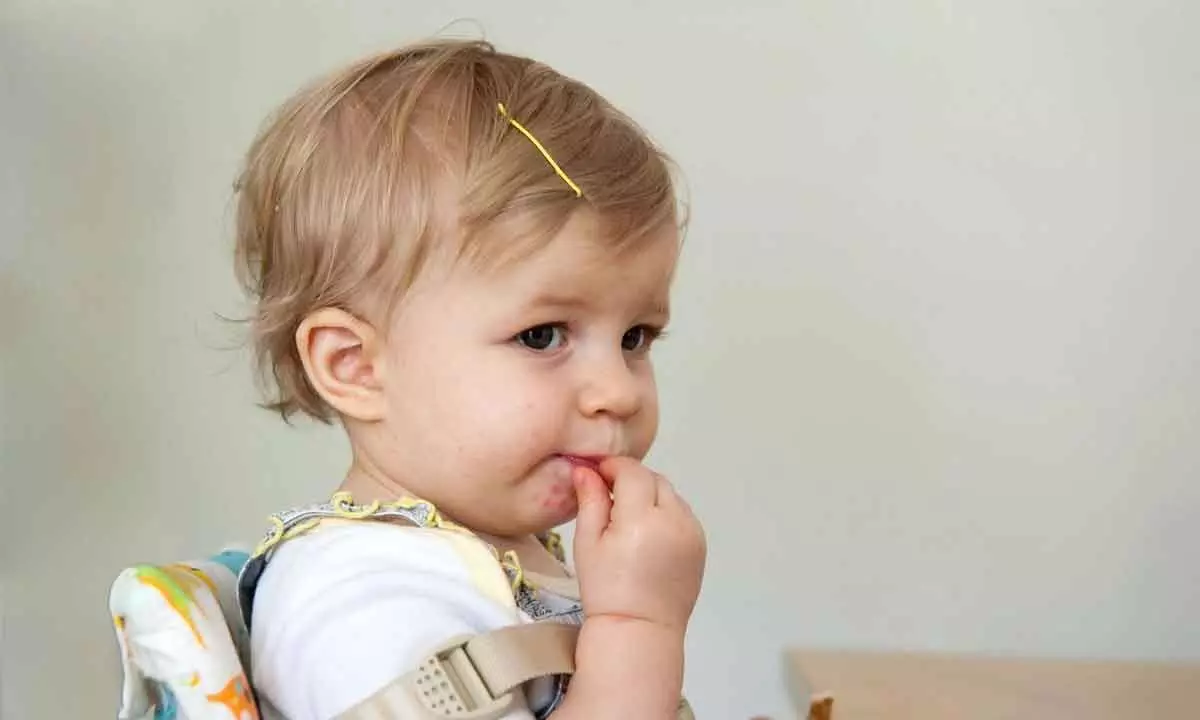Keep your children safe from Hand-foot-and-mouth disease

Hand-foot-mouth disease is a self-limiting disease, with mostly mild symptoms, but it is highly contagious. It is most commonly caused by a virus named coxsackievirus.
Hand-foot-mouth disease is a self-limiting disease, with mostly mild symptoms, but it is highly contagious. It is most commonly caused by a virus named coxsackievirus. It is common in young children; the symptoms include sores in the mouth, and a rash on the hands and feet. There's no specific treatment for this disease. Frequent hand-washing and avoiding close contact with people who have this disease may help lower a child's risk of infection.
'Tomato flu' is an alternative name for this virus, which has become popular in the media recently, causing bit of panic amongst the public. As hand foot mouth disease produces red spots on the skin the name 'Tomato flu' has been given. As such, there is no new research suggesting definite emergence of any new disease like tomato flu or tomato fever as of now. Some correspondents are suggesting this to be a variant of HFMD or the after-effects of chikungunya or dengue, but these are yet to be accepted amongst the scientific community.
Major symptoms of Hand-foot-and-mouth disease
Fever, sore throat, painful blister-like lesions on the palate, tongue, gums and inside of the cheeks, reddish rash on the palms, soles and sometimes the buttocks, fussiness in infants and toddlers, loss of appetite are the major symptoms of the disease.
Usually, it takes 3 to 6 days from initial infection to the time symptoms appear (incubation period). One or two days after the fever begins, painful sores may develop in the front of the mouth or throat. A rash on the hands and feet, and sometimes on the buttocks may also appear.
Hand-foot-and-mouth disease is usually a minor illness. It typically only causes fever and mild symptoms for a few days. Seek medical help if child is younger than six months, has a weakened immune system, has mouth sores or a sore throat that makes it painful to drink fluids, or symptoms don't improve after 7 to 10 days.
The most common cause of hand-foot-and-mouth disease is infection from coxsackievirus. Other viruses also may cause hand-foot-and-mouth disease. Most people get the coxsackievirus infection — and hand-foot-and-mouth disease — through the mouth.
The illness spreads by person-to-person contact with an infected person's:
• Nose secretions or throat discharge
• Saliva
• Fluid from blisters
• Stool
• Respiratory droplets sprayed into the air, after a cough or sneeze
Children are most contagious during the first week of having hand-foot-and-mouth disease. But the virus can remain in the body for weeks after the symptoms go away. That means the child still can infect others. Some people, especially adults, can pass the virus without showing any symptoms of the disease. In tropical climates, outbreaks occur during the rainy season.
Risk factors
Age is the main risk factor for hand-foot-and-mouth disease. The disease mostly affects children younger than ages 5 to 7 years. Children in child care settings are especially vulnerable, because the infection spreads by person-to-person contact. Hand-foot-mouth-disease typically affects young children, but anyone can get it.
Older children and adults are usually thought to have immunity against hand-foot-and-mouth disease. They often build antibodies after exposure to the viruses that cause the disease. But, adolescents and adults sometimes still get hand-foot-and-mouth disease.
The most common complication of hand-foot-and-mouth disease is dehydration. The illness can cause sores in the mouth and throat, making it painful to swallow. Encourage your child to drink fluids during the illness. If children become too dehydrated, they may need intravenous (IV) fluids in the hospital. Hand-foot-and-mouth disease is usually a minor illness. Complications like brain and heart involvement may be there, but they are very rare.
Risk of contracting hand-foot-and-mouth disease can be prevented in many ways:
Wash hands often: Wash hands for at least 20 seconds. Be sure to wash your hands after using the toilet or changing a diaper. Also, wash hands before preparing or eating food and after blowing the nose, sneezing or coughing. When soap and water aren't available, use hand sanitizer.
Teach good hygiene: Show children how to wash their hands and help them do it often. Show them how to practice overall good hygiene. Explain to them why it's best not to put their fingers, hands or any other objects in their mouths.
Disinfect common areas: In a child care setting, strict schedule for cleaning and disinfecting should be followed. The virus can live for days on surfaces in common areas, including on door knobs, and on shared items such as toys.
Avoid close contact: Because hand-foot-and-mouth disease is highly contagious, people with the illness should limit their exposure to others while they have symptoms. Keep children with hand-foot-and-mouth disease out of their child care setting or school until fever is gone and mouth sores have healed.
(The author is a Consultant Pediatrician, Apollo Cradle & Children's Hospital, Kondapur)














